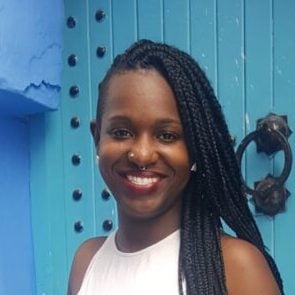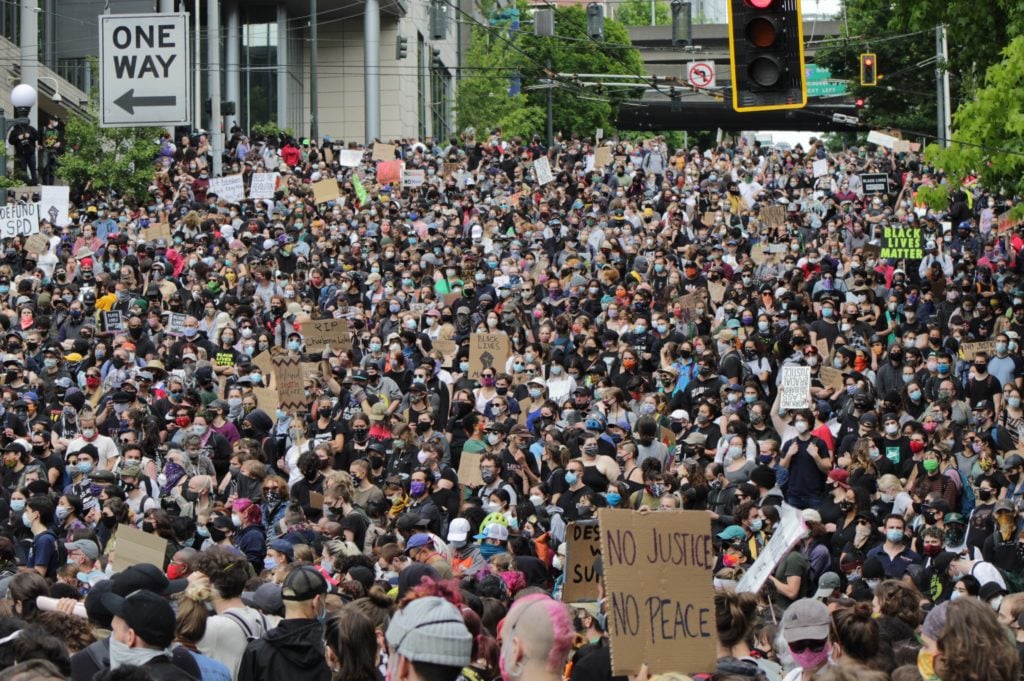The Seattle People’s Party (SPP) formed in the aftershock of the November 2016 elections. It took on the threat of discouragement and apathy by building local political power, especially for city residents who had been shut out of decision-making.
Running as the SPP’s candidate for mayor in 2017, Nikkita Oliver came in third in a field of 21. They missed the general election by under one percentage point. Now they’re running for position 9 on the Seattle City Council. A co-founder of the SPP, Oliver serves as the executive director of Creative Justice, an arts-based alternative to incarceration and a healing engaged youth-led community-based program. They organize with No New Youth Jail, Decriminalize Seattle, and Covid-19 Mutual Aid – Seattle. In a May 19 interview with Frontline Dispatches, they talked about the interrelationship between grassroots organizing, last year’s racial justice uprisings, and the SPP’s electoral work. This is an excerpt from that interview.
The first election I participated in as a candidate was post- the 2016 election, after a lot had happened at Standing Rock, many were organizing in defund movements in their cities, to divest from fossil fuels, to divest from Wall Street banks that were invested in fossil fuels, and for many years we had been organizing a “no new youth jail” campaign and a “block the bunker” campaign around building a new police station in the north end of Seattle.
Electoral campaigns typically have a mainstream way of running. They have insider games, they take lots of money. They’re not meant for marginalized people. They’re meant for the ruling class. We wanted to bring grassroots organizing to electoral politics so people could get excited about it, and so it would be about more than winning a seat. It would be about building community power, because as Ella Baker says, ‘We don’t need more strong leaders. We need strong communities.’ How do we do that to amplify grassroots struggles – the work that has been happening and will continue to happen – to push our electeds to make changes? …
The power of grassroots organizers comes out of relationship building, and our belief that those who have proximity to the struggle also have proximity to the solutions that can dismantle oppressive systems. That’s core and foundational to the way we organize and to the way we campaign.
In 2017, we built our platform around listening posts. We developed a way of being in communities, even communities that may not have been very responsive to our campaign at first, sitting with them and talking. What’s going on? What are you needing? What are you thinking about? … And we took a page out of the Black Panther Party’s book: if you meet people’s needs, they’ll be more able to engage in politics.
For this campaign, mutual aid is a huge part of what we are doing. How have community-based networks been a part of what met people’s needs in a pandemic?… How have not just the uprisings of 2020 but even the uprisings of previous years contributed to the political work that we’re doing, acknowledging that those roots exist in impacted communities? . . .
After 2020, talk of abolition no longer taboo
Since 2010 Seattle has been growing in our understanding of what makes community safe, thinking about basic needs. What does it look like to have social affordable housing? What is contributing to why people are so dependent on the police or courts or prosecution? How do we divest from oppressive systems and invest in community? That’s a dialogue we’ve been having for a while. 2020 allowed that conversation to surface into the mainstream in the Seattle and King County area in a way that talking about abolition isn’t taboo anymore. People don’t look at you and say, ‘You’re too radical.’
Seattle has been on a trajectory of seeing people grow energy, grow initiative, outside of the Democratic establishment. The movement last summer and fall and into this year around investing in community-based alternatives to policing has grown the base for the conversation that groups like the Seattle People’s Party – and No New Youth Jail, and Block the Bunker – that groups like that have been having for a long time. We’re all feeding into each other. . .
We’ve had some significant wins because of the uprising last year. We’ve seen a nearly 18% defund in the Seattle police department budget. . .We’ve seen the city make strategic moves towards participatory budgeting to have a more democratic process of determining how those defund dollars are actually invested in community-based, community-led initiatives. The city also invested $3 million in a research project led by some of the most marginalized Black community members in the city to develop what are the things that could underpin participatory budgeting that would actually impact the Black community. We’ve had very significant wins that only come as a result of the uprisings and that are directly reflective of the demands put out in June of 2020. Do I think that we’ve gone far enough or that we’ve done enough work? Absolutely not. But the work that has happened is directly correlates to the movement of the people.
Did you enjoy this article?
We're in the middle of our annual fund drive, and this year we're building our own internal infrastructure for subscriptions, meaning more of every dollar pledged goes to fulfilling our mission. Subscribe today to support our work and be a part of Convergence's next evolution.

